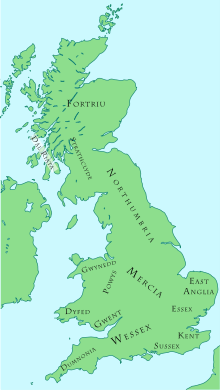- England in the Middle Ages
-
England in the Middle Ages concerns the history of England during the Medieval period — from the end of Roman rule in Britain through to the Early Modern period. It is in this formative period that England emerged as a unified and political entity, and transformed over several centuries from a diverse, warring and fractious land of petty kingdoms, into one of Europe's most centralised, powerful and richest states.
Early Medieval England corresponds to Anglo-Saxon England, which began with the arrival of the Anglo-Saxons in southern Britain. In this period, the Brythonic kingdoms whose territories lay within the area of modern England were conquered by Jutes, Angles and Saxons Germanic tribes, from the contemporary Angeln and Jutland areas of Northern Germany and mainland Denmark. Political takeover of other areas of England proceeded piecemeal and was not completed until the 10th century.
Similarly, the end of the medieval period is usually dated by the rise of what is often referred to as the English Renaissance in the reign of Henry VIII, and the Reformation in Scotland, or else to the establishment of a centralised, bureaucratic monarchy by Henry VII. From a political point of view, the Norman conquest of England divides medieval England into two distinct phases of cultural and political history. From a linguistic point of view the Norman Conquest had only a limited effect, Old English evolving into Middle English, although the Anglo Norman language would remain the language of those that ruled for two centuries at least, before mingling with Middle English.
At the height of pre-Norman medieval English power, a single English king ruled to the borders with Scotland and Wales. After the Norman Conquest, Anglo-Norman power intruded into Wales with increasing vigour. Southern England had closer relationships with Normandy, Flanders and Brittany, owing to relative proximity, than had the other regions.
Contents
Periodisation
- Sub-Roman Britain (5th to 6th centuries)
- Early Middle Ages (7th to 11th centuries): England, Scotland
- Heptarchy (Anglo-Saxon England)
- House of Wessex
 (6th to 11 centuries)
(6th to 11 centuries)
- House of Wessex
- Viking Age
- House of Denmark (1013-1014; 1016-1042)
- Heptarchy (Anglo-Saxon England)
- High Middle Ages (11th to 13th centuries): England
- Norman rule (1066–1154)
- House of Plantagenet
 (1154–1485)
(1154–1485)
- Late Middle Ages (14th and 15th centuries): England
- House of Plantagenet
 (1154–1485)
(1154–1485)
- House of Lancaster
 (1399–1461; 1470-1471)
(1399–1461; 1470-1471) - House of York
 (1461–1470; 1471-1485)
(1461–1470; 1471-1485)
- House of Lancaster
- House of Plantagenet
- Transition to Early Modern Britain: England and Wales
- House of Tudor
 (1485–1603)
(1485–1603)
- Elizabethan era (1558-1603)
- House of Tudor
List of states
Early Middle Ages
Anglo-Saxon states
See: Heptarchy
Celtic kingdoms
The territories of the following early Brythonic kingdoms were absorbed into Anglo-Saxon and early medieval England:
Viking Age
- Danelaw
- Earldom of Orkney (867-1468)
- Jórvík (867-954)
- House of Alpin (843–878) & (889–1040)
- House of Moray (1040–1058)
High Middle Ages
post-1066 states
- Norman England (1066–1154)
- House of Plantagenet
 (1154–1485)
(1154–1485)
Late Middle Ages
- House of Lancaster
 (1399–1471)
(1399–1471) - House of York
 (1461–1485)
(1461–1485) - House of Tudor
 (1485–1603)
(1485–1603)
See also
- Anglo-Norman
- Celtic Christianity
- Childhood in Medieval England
- Economy of England in the Middle Ages
- English historians in the Middle Ages Important English historians and historical works from the Middle Ages.
- Groans of the Britons
- History of Anglo-Saxon England—England between the 5th century and the Norman Conquest.
- History of England
- History of Wales
- List of English chronicles
- Medieval France
- Norse activity in the British Isles
- Scotland in the Middle Ages
European Middle Ages Early Middle Ages Migration Period · Decline of the Western Roman Empire · Late Antiquity · Decline of Hellenistic religion · Christianization · Rise of Islam · First Bulgarian Empire · Frankish Empire · Bagratid Kingdom of Armenia · Kingdom of Croatia · Anglo-Saxon England · Viking Age · Carolingian Empire · Old Church Slavonic · Kievan Rus' · Growth of the Eastern Roman EmpireHigh Middle Ages Holy Roman Empire · Armenian Kingdom of Cilicia · Second Bulgarian Empire · Feudalism · Great Schism · Investiture controversy · Crusades · Scholasticism · Monasticism · Communalism · Manorialism · Medieval Warm PeriodLate Middle Ages Culture Architecture · Art · Church and State · Cuisine · Demography · Literature · Medicine · Music · Philosophy · Poetry · Science · Technology · WarfareSee also Categories:- History of the British Isles
- Norman and Medieval England
- Sub-Roman Britain
- Anglo-Norse England
- High Middle Ages
- Late Middle Ages
Wikimedia Foundation. 2010.

